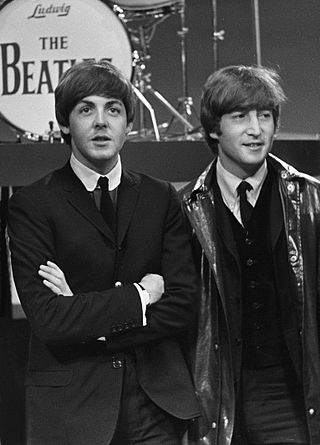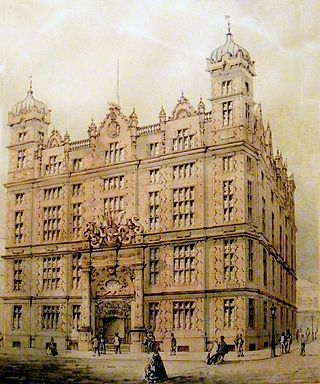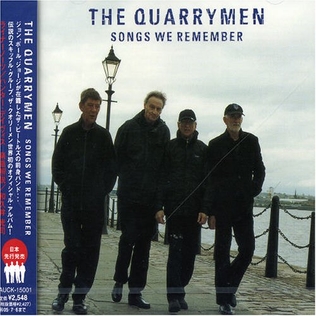
The Quarrymen are a British skiffle/rock and roll group, formed by John Lennon in Liverpool in 1956, which evolved into the Beatles in 1960. Originally consisting of Lennon and several school friends, the Quarrymen took their name from a line in the school song of their school, the Quarry Bank High School. Lennon's mother, Julia, taught her son to play the banjo, showed Lennon and Eric Griffiths how to tune their guitars in a similar way to the banjo, and taught them simple chords and songs.

"Yesterday" is a song by the English rock band the Beatles, written by Paul McCartney and credited to Lennon–McCartney. It was first released on the album Help! in August 1965, except in the United States, where it was issued as a single in September. The song reached number one on the US charts. It subsequently appeared on the UK EP Yesterday in March 1966 and made its US album debut on Yesterday and Today, in June 1966.
The Beatles' bootleg recordings are recordings of performances by the Beatles that have attained some level of public circulation without being available as a legal release. The term most often refers to audio recordings, but also includes video performances. Starting with vinyl releases in the 1970s, through CD issues in the late 1980s, and continuing with digital downloads starting in the mid 1990s, the Beatles have been, and continue to be, among the most bootlegged artists.

"Helter Skelter" is a song by the English rock band the Beatles from their 1968 album The Beatles. It was written by Paul McCartney and credited to Lennon–McCartney. The song was McCartney's attempt to create a sound as loud and dirty as possible. It is regarded as a key influence in the early development of heavy metal. In 1976, the song was released as the B-side of "Got to Get You into My Life" in the United States, to promote the Capitol Records compilation Rock 'n' Roll Music.

Lennon–McCartney was the songwriting partnership between English musicians John Lennon (1940–1980) and Paul McCartney of the Beatles. It is widely considered one of the greatest, best known and most successful musical collaborations ever by records sold, with the Beatles selling over 600 million records worldwide as of 2004. Between 5 October 1962 and 8 May 1970, the partnership published approximately 180 jointly credited songs, of which the vast majority were recorded by the Beatles, forming the bulk of their catalogue.

My Bonnie is a 1962 album by English rock and roll singer-songwriter and musician Tony Sheridan. Sheridan, then playing in clubs in Hamburg with the Beatles, was discovered by producer Bert Kaempfert and subsequently signed with him to record for Polydor. Sheridan recorded several songs with the Beatles, of which only a single was released in 1961, the titular "My Bonnie" and B-side "The Saints", credited to Tony Sheridan and the Beat Brothers. While both songs are included here, the remaining tracks on this album were credited again to the Beat Brothers but recorded without the Beatles.

Live! at the Star-Club in Hamburg, Germany; 1962 is a double album featuring live performances by the English rock band the Beatles, recorded in late December 1962 at the Star-Club during their final Hamburg residency. The album was released in 1977 in two different versions, comprising a total of 30 songs by the Beatles.

"I Feel Fine" is a song by the English rock band the Beatles that was released in November 1964 as the A-side of their eighth single. It was written by John Lennon and credited to the Lennon–McCartney partnership. The recording includes one of the earliest uses of guitar feedback in popular music.

"You've Got to Hide Your Love Away" is a song by the English rock band the Beatles. It was written and sung by John Lennon and released on the album Help! in August 1965.
"Till There Was You" is a show tune written by Meredith Willson, popularised by his 1957 stage production The Music Man and its 1962 movie musical adaptation, and further popularised by the Beatles cover.

"You've Really Got a Hold on Me" is a song written by Smokey Robinson, which became a 1962 Top 10 hit single for the Miracles. One of the Miracles' most covered tunes, this million-selling song received a 1998 Grammy Hall of Fame Award. It has also been selected as one of The Rock and Roll Hall of Fame's 500 Songs that Shaped Rock and Roll. It was recorded by the Beatles for their second album, With the Beatles (1963). Many other musicians also recorded versions.

"In Spite of All the Danger" is the first song recorded by the Quarrymen, then consisting of John Lennon, Paul McCartney, George Harrison, pianist John Lowe, and drummer Colin Hanton.

"Maggie May" is a traditional Liverpool folk song about a prostitute who robbed a "homeward bounder": a sailor coming home from a round trip.
"Come Go With Me" is a song written by C. E. Quick, an original member of the American doo-wop vocal group the Del-Vikings. The song was originally recorded by The Del-Vikings in 1956 but not released until July 1957 on the Luniverse LP Come Go With The Del Vikings. The final version was released in the second week of January 1957 and was led by Gus Backus. When Joe Averbach, the owner of Fee Bee Records couldn't handle the demand, he signed with Dot Records in late January 1957; the song became a hit, peaking at No. 5 on the US Billboard Top 100 Pop Charts. It also reached No. 2 on the R&B chart.
"Cayenne" is an instrumental track by the Beatles. It was recorded in 1960, when they were still known as the Quarrymen, and was not officially released until its inclusion on the 1995 album Anthology 1.

"Twenty Flight Rock" is a song originally performed by Eddie Cochran in the 1956 film comedy The Girl Can't Help It, and released as a single the following year. The song was published in 1957 as written by Ned Fairchild and Eddie Cochran, by American Music Incorporated and Campbell, Connelly and Company. Cochran's contribution was primarily on the music. His version is rockabilly-flavored, but artists of a variety of genres have covered the song.

John Charles "Duff" Lowe was an English pianist. In the late 1950s, he played piano for The Quarrymen, the group who would evolve into The Beatles.
"Hello Little Girl" is one of the first songs written by John Lennon, credited to the Lennon–McCartney songwriting partnership. Written in 1957, it was used as one of the songs at the Beatles unsuccessful Decca audition in 1962, included on the 1995 compilation album Anthology 1. A 1960 home demo recording has never been officially released.

Songs We Remember is the third album by the re-incarnated version of the Quarrymen, which was the band that eventually evolved into the Beatles. It is also the final album to feature founder member Eric Griffiths before his death in 2005.

Get Back – Together is the second album by the reformed Liverpool band the Quarrymen, which was the band that, in its original conception, evolved into the Beatles. It is also the first of two albums by the band that feature all surviving founding members together, as while the name the Quarrymen name was used in the 1994 album Open for Engagements seen as the first album since the reformation, it only featured Rod Davis and part-time member John Duff Lowe. Eric Griffiths and Len Garry make their first appearances on a studio recording with drummer Colin Hanton also returning to the band for the first time since 1959, having previously appeared on the "In Spite of All The Danger" recording in 1958 as a b-side to a cover of Buddy Hollys "That'll Be the Day". It is also the only full length album featuring Pete Shotton who also returned to the band in 1997 but later retired due to ill health. Shotton subsequently died in 2017. Recorded and mixed at Liverpool Music House by record producer and recording engineer Lance Thomas.














